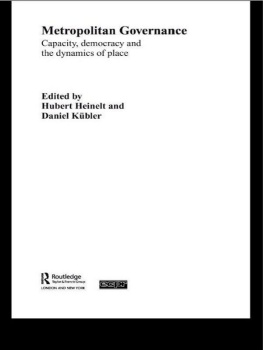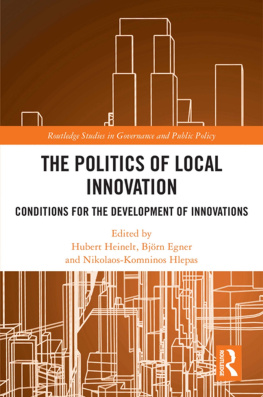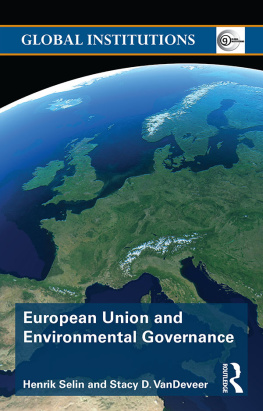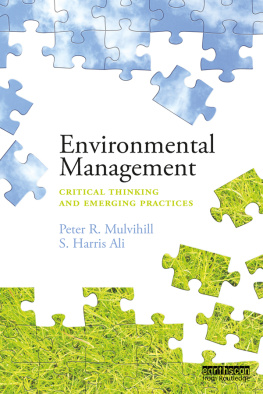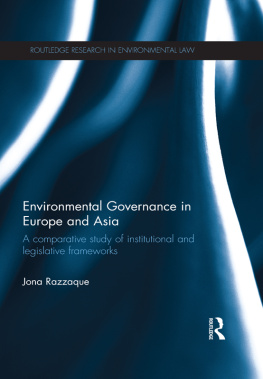EUROPEAN UNION ENVIRONMENT POLICY AND NEW FORMS OF GOVERNANCE
First published 2001 by Ashgate Publishing
Reissued 2018 by Routledge
2 Park Square, Milton Park, Abingdon, Oxon OX14 4RN
711 Third Avenue, New York, NY 10017, USA
Routledge is an imprint of the Taylor & Francis Group, an informa business
Copyright Hubert Heinelt, Tanja Malek, Randall Smith, Annette E. Tller 2001
All rights reserved. No part of this book may be reprinted or reproduced or utilised in any form or by any electronic, mechanical, or other means, now known or hereafter invented, including photocopying and recording, or in any information storage or retrieval system, without permission in writing from the publishers.
Notice:
Product or corporate names may be trademarks or registered trademarks, and are used only for identification and explanation without intent to infringe.
Publishers Note
The publisher has gone to great lengths to ensure the quality of this reprint but points out that some imperfections in the original copies may be apparent.
Disclaimer
The publisher has made every effort to trace copyright holders and welcomes correspondence from those they have been unable to contact.
ISBN 13: 978-1-138-70428-2 (hbk)
ISBN 13: 978-1-315-20273-0 (ebk)
This book is one of the products of research funded by the Volkswagen Foundation under its programme Law and Behaviour - Origins, Effects and Development of Law in the Context of Human Behaviour. The project ran from September 1997 to August 1999. We are most grateful to the Foundation for their support. Subventions to underpin the production of this book have also come from the Vice Chancellors budget at the University of Bristol and from the budget of the Centre for Urban Studies in the School for Policy Studies at the University of Bristol.
The study focused on the implications of EU procedures embedded in legal instruments like the Environmental Impact Assessment (EIA) Directive and Eco Management and Audit Scheme (EMAS) Regulation. There are two key issues that need to be distinguished. First, there is the issue of whether the application of these instruments may have triggered a breakthrough in reflexive understanding of the effects of unthinking behaviour on the natural and social environment, and whether this might lead to changes in concrete decisions and patterns of action. This first issue echoes the main conceptual concern of the study, namely, under what conditions can a change in decision making behaviour be successfully achieved through negotiation and debate. The second issue flows from this, namely, how has European Union legislation influenced national environment law. In this context, the issue of how EIAs and EMAS can be implemented in or adapted to a national context is also raised.
Germany, Greece and Britain were selected for the study of these issues because they have different approaches to solving environmental policy problems, different legal and administrative cultures, and differences in socio-economic profile.
Within a multilevel model of the political system of the EU, three levels of analysis were undertaken:
Origin and development of the EIA directive and EMAS regulation at supranational level;
Implementation of EU law at national level in the three member states;
Application and impact of EIA procedures and EMAS at the local level.
Four study groups were involved in the project. One was based in the Darmstadt University of Technology and was led by Hubert Heinelt, who was also responsible for overall co-ordination of the project with Tanja Malek, Annette E. Tller and Nicola Staeck as an external colleague from the University of Bielefeld. The second was from the University of Bristol with Randall Smith and Malcolm Mcintosh. The third was led by Panagiotis Getimis from the Panteion University of Athens assisted by Evanthia Athanassopoulou, Zefi Dimadama and Georgia Giannakourou, and the fourth was from the University of Oldenburg with Jiirgen Taeger and Karl Heinz Haunhorst.
We would also like to thank the following colleagues in Darmstadt, Bjorn Egner, Nicos Georgakis, Christine Konig, Edith Peper and Georgios Terizakis, for their invaluable support in the literature search, organisation and evaluation of the written survey, revision of texts and administration of the project. In Bristol, grateful thanks are due to Lin Amber and Sue Hopkins of the University Library, Isabella Aboderin, Katrin Sauer, Claudia Bittencourt and especially to Angela Torrington, who brought a very complicated text into a form acceptable to our publisher. Thanks are also due to friends, colleagues and family who have not been unaffected by the exercise.
Hubert Heinelt | Randall Smith |
Tanja Malek | Bristol |
Annette E. Tller
Darmstadt |
Eva Athanassopoulou works for the government office in the region of Western Greece.
Zefi Dimadama is a researcher at the Institute of Urban Environment and Human Resources at Panteion University of Social and Political Sciences.
Panagiotis Getimis is Professor and Director of the Institute of Urban Environment and Human Resources at Panteion University of Social and Political Sciences.
Georgia Giannakourou is a researcher at the Institute of Urban Environment and Human Resources at Panteion University of Social and Political Sciences.
Karl Heinz Haunhorst was a researcher at the University of Oldenburg at the time of the study. He is now a lawyer in a consultancy.
Hubert Heinelt is Professor of Public Administration and Urban Studies in the Institute for Political Science, Darmstadt University of Technology.
Tanja Malek is a researcher at the Institute for Political Science, Darmstadt University of Technology.
Malcolm McIntosh was a Visiting Fellow at the School for Policy Studies, University of Bristol at the time of the study. He is now Director, Corporate Citizenship Unit, Warwick Business School, University of Warwick.
Randall Smith is a Reader in Policy Studies at the School for Policy Studies, University of Bristol.
Nicola Staeck is Assistant Professor in the Faculty of Sociology, University of Bielefeld.
Jiirgen Taeger is Professor of Private Law in the Institute for Law at the University of Oldenburg.
Annette E. Tller is a researcher at the Institute for Political Science, Darmstadt University of Technology.
Part I:
Policy Overview And Analytical Framework
Hubert Heinelt, Tanja Malek, Nicola Staeck and Annette E. Tller
It is widely recognised that the EU is having an increasing impact on policy making in the member states. This is especially true for environmental policy, partly because national standards laid down in law are being questioned and in some respects harmonised and partly because the debate within member states about the aims, content and settings of environmental policy - i.e. what could and should be achieved by which instruments - has been influenced by policy developments at the European level. One feature of this debate has been the search for alternatives to the traditionally dominant command and control approach in the EU as well as in national environmental policy. However, since the command and control approach is closely linked to a state centred vision of co-ordination or at least state influenced forms of decision making by individual as well as collective actors, the questioning of this traditional approach implies the necessity to consider modern non-hierarchical forms of governance. The crucial question in this context is therefore: is the command and control approach still appropriate in a modern risk society or should one be seeking another approach in order to achieve governability?


